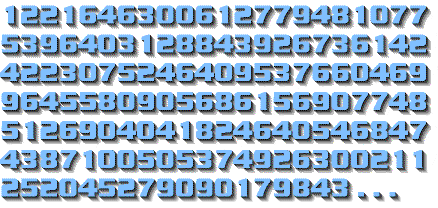Setting a Prime Number Record
A computer search has turned up the largest prime number yet found.
By Emily Sohn
What’s the biggest number you can think of? A billion? A trillion? A googol? (That’s 1 followed by 100 zeroes.) Whatever number you come up with, there’s always a larger one. You could write down 1 and keep adding zeroes after it until you hand gets tired, and you still wouldn’t get to the “last” number. There’s always another number right after whatever you’ve written down. Just add 1 and you’ll get a bigger number.
Certain types of numbers, though, are special. A computer search has now turned up the largest example yet found of a type known as prime numbers. The new champion is 7,816,230 digits long. If you could write 10 digits per second, it would take you more than 9 days to copy out the entire number!
 |
|
The first few digits of the world’s largest known prime number, a whole number divisible only by itself and 1. When written out in full, this champion number is 7,816,230 digits long! |
There are lots of different kinds of numbers and lots of ways to play with these numbers. You may have learned about whole numbers, fractions, integers, or even imaginary numbers. And you’ve probably done plenty of adding and subtracting, multiplying and dividing.
For most people, math is just a useful set of skills that helps them count, make change, or cut cakes and pizzas into pieces of the right size or shape. For mathematicians and others, however, there’s something magical about numbers, especially those that fall into the category of prime numbers.
Prime numbers are whole numbers that can be divided evenly only by themselves and 1. One example of a prime number is 13. Only the numbers 1 and 13 divide into 13 without leaving a remainder. The number 8 is not a prime because it’s divisible by 1, 2, 4, and 8—not just 1 and 8. The first few prime numbers are 2, 3, 5, 7, 11, 13, 17, 19, 23, and 29.
It can be really hard to tell whether a number is a prime, especially if it’s a huge number. It’s easy to check whether 13 is a prime, for example. Just divide all the numbers that come before it into 13 and make sure that none divide into 13 evenly. For a big number, even with all sorts of shortcuts that mathematicians have found over the years for doing this, it takes much, much longer to find out.
The new champion prime was found by a computer. As part of the Great Internet Mersenne Prime Search (GIMPS), people all over the world have donated computer time to search for primes. More than 250,000 computers are now involved, each one looking for primes whenever someone isn’t using the computer for anything else.
The record-breaking number turned up on an office computer owned by Martin Nowak, a German eye surgeon and a huge math fan. At 7,816,230 digits, it’s some 500,000 digits longer than the previous record holder. The number can also be written as 2 to the 25,964,961st power minus 1. That’s one less that 2 multiplied by itself 25,964,961 times. Try that on your calculator!
Now, computers worldwide are looking for an even bigger prime. And there’s no end in sight. There will always be a bigger one!—E. Sohn
Going Deeper:
Klarreich, Erica. 2005. New largest prime discovered. Science News 167(March 19):188. Available at http://www.sciencenews.org/articles/20050319/note11.asp .
Peterson, Ivars. 2005. Primal surge. Science News Online (March 5). Available at http://www.sciencenews.org/articles/20050305/mathtrek.asp .
You can learn more about the search for gargantuan prime numbers at www.mersenne.org/prime.htm (Great Internet Mersenne Prime Search).







